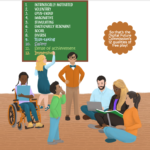Walking on walking,
under foot earth turns.
Streams and mountains never stay the same.
—Gary Snyder, from Mountains and Rivers Without End
In 2017, I tested something I called the TimeDesign Challenge with a small group. It was an 8-week exploration into our relationship with time—and in particular, how technology impacts our time. We noticed our stories about time, mapped our days, and reflected on how effective we felt in getting stuff done—things we really cared about and the day-to-day necessities. We got more designerly in how we approached time, technology, and our intentions. We ran experiments, we assessed, we iterated.
How are you experiencing time these days? As we prepare to make the shift from naming the year we’re in 2017 to 2018, it’s a good time to think about time.
What were your personal stories or themes in 2017 about time? Consider how your sense of time changed or didn’t from the previous year or two. When do you feel best inhabiting your time? When do you experience the greatest challenges with time? How does the inevitable experience of chaos affect you and what brings it on? What was your most timeless moment in the last year?

If you can “find some time” over the next few days before “year end,” sit down with a cup of tea and write some short responses to the questions in the previous paragraph. Think of them as clues for uncovering your time stories and making them visible. Consider what your children, young or older, are learning about time from you. What stories are they telling you, not just in words, but in actions? What new stories would you like to tell in the year ahead?
I’d love to hear. Here’s an invitation…Write me (use the Contact form here on the website) to let me know how you’re thinking about time, technology, and family. I’ll schedule a video call with you to talk about it together. If you’re in the Bay Area, we can meet in person.
MEANWHILE…
What I’m reading: I spotted a solid & short (yay!) piece about Bridging the Worlds when you’d like to help your kids shift out of what they’re engaged in on tablets, phones, or laptops, and into something else without triggering rapid dopamine withdrawal meltdowns. Those of you who know me well, know that I don’t like the label “screentime” but the writer dives under that overworked metaphor to offer a down-to-earth, science-based strategy.
My current longer read is Altered Traits: Science Reveals How Meditation Changes Your Mind, Brain, and Body by Daniel Goleman and Richard J. Davidson. I’m still in the early history about the development of the science around meditation. Goleman and Davidson are two of the pioneers. They give their perspectives on the roots of mindfulness practice which I am appreciating (I’m also a fan of a different lineage of mindfulness—Harvard psychology professor Ellen Langer. Here’s a short talk at PopTalk with a great title: Mindfulness over Matter). I reviewed another book by Goleman in a previous post here.
Welcome to all the people who subscribed in 2017. Thank you for your interest in hearing what I have to share. I encourage you to let me know what you’d like me to write about (use the Contact form here on the website). I really appreciate hearing from all of you about what’s on your mind—challenges, insights, questions, recommendations.


